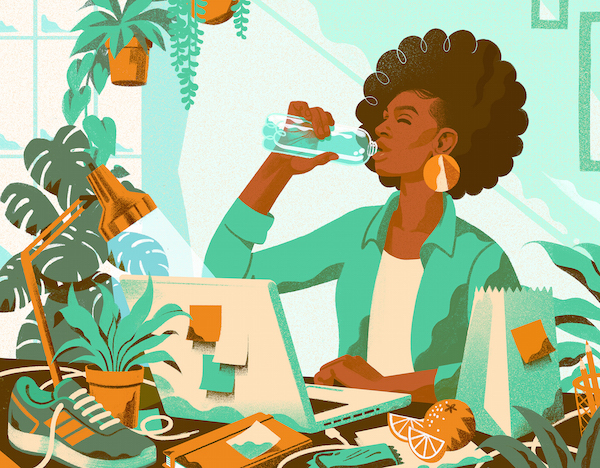The trial is the most high-stakes event in the legal system. Your client’s life, reputation or fortune is at risk, and your work ethic will, at least in part, determine the outcome. So your own welfare, surely, can take a back seat. Don’t worry about sleep; simply work through the night, using sugar-dense snacks and coffee as fuel. Exercise, of course, is a frivolous waste of time. You’ll need that time to refine your upcoming cross-examination.
This might sound logical, but it’s nonsense. Amid the chaos of a trial, the best litigators make it a priority to sleep well, eat right and stay active. It keeps their minds sharp and helps safeguard their mental health. Your next long trial might be at the courthouse or, if our social-distancing requirements haven’t been lifted, you might find yourself before a judge over Zoom. No matter what form your next trial takes, these health-boosting tips will keep you at the top of your game.
1. Build a meal plan
“Maintaining a healthy diet is important, but it’s difficult,” says Andrew Bernstein, a partner and commercial litigator at Torys LLP. “Before a trial, I plan out what I’m going to eat each day. I try to avoid carbs at lunch and stick to proteins and vegetables: chicken, tuna or legumes, alongside a salad or warm veggies. The planning helps me prevent the bad decisions that you make when you’re scrambling for food.”
You can even plan lunch at the courthouse. During one trial, at 1000 Finch Avenue, Angela Chaisson pre-bought four months’ worth of lunches (including tips) at the cafeteria. “I never wasted time thinking about what I was going to eat or waiting in lines,” says the criminal-defence lawyer at Angela Chaisson Law. “I walked in and picked up my order from the counter. I have the taste buds of a child, so I was eating cucumber, tomato and cream cheese sandwiches. But that’s better than a bowl of Lucky Charms.”
2. Avoid caffeine
“Drink water, not coffee,” advises Malik Martin, a partner at Rueters LLP, a busy litigation boutique in Toronto. “Caffeine has a long half-life. Even if your last cup is mid-afternoon, the caffeine may still be in your system at 10 p.m. That makes it harder to sleep.”
Chaisson is equally wary of caffeine. “Water makes you hydrated, which feels nice,” she says. “Too much coffee makes you feel jittery, which is less nice.”
3. Don’t stay up past bedtime
All-nighters are a terrible idea. “I don’t function without sleep,” says Bernstein. “During a trial, I try to be in bed by 11 and up at 6:30.”
Martin, for his part, uses his seven-year-old son as a reverse alarm clock. “When I put him to bed at nine o’clock, I go to bed too, so we’re on the same routine,” he says. “Sleep is so important. It reduces stress, maintains the immune system and helps you stay sharp.”
4. Move your body
Even a modest amount of exercise can have a significant impact. During breaks, both Martin and Bernstein make an effort to take walks when they can. “You might think taking a walk is a waste of valuable time,” says Bernstein. “But it helps you think more clearly.” As Malik puts it: “It’s important to get some sun.”
5. Celebrate the ending
At a trial’s conclusion, it’s important to take time to recharge. “I don’t see my family that much during a trial,” says Bernstein. “Afterwards, it’s nice to schedule a few days off to be with them.”
And if you can’t take any vacation days, it’s still nice to mark the milestone. “As a solo lawyer, I usually don’t have time after a trial to take time off,” says Chaisson. “But I still like to unwind, usually with a good cheeseburger and a nice bottle of red.”

This story is from our Summer 2020 Issue.
Illustration by Cristian Fowlie


